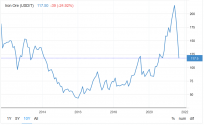Why is it fallacious to suggest that ASEAN might develop closer ties rather than bandwagoning with a growing power? Balance of power theory allows for both outcomes, it really just comes down to the way the analysis is framed.
Because the theory is insufficiently constrained. An unconstrained BoP "solution" might naively add up all the ASEAN states into a unified security bloc, but it ignores the difficulties of coordination that I outlined. Namely, the costs of coordinating disparate actors and the fact that upgrading ASEAN to a security partnership won't bring much added economic benefit since the ASEAN economies are already closely intertwined. Neither will it bring much security benefit since even taken together the combined militaries of the ASEAN states would still be feeble.
Even if everything went as well as it possibly could for an ASEAN bloc, it would still suck. Hence, no ASEAN state would want to pay the costs of joining such a bloc.
That's more or less the definition of rationality - but it's an assumption that states always behave rationally and assumptions can be wrong. I would be more comfortable examining the situation through the lens of regional security, as I'm more familiar with security studies, but to analyse the current situation with any degree of accuracy is a daunting task.
I'm of the belief that every actor's behaviour is rational as a first approximation, and most seeming irrationality is a result of incorrectly analyzing that actor's incentives. For example, Australia's antagonistic behaviour toward China might be seen as irrational from an excessively abstract point of view, but it's perfectly rational when you observe Australia's history and note that it values Anglophonic solidarity (the polite way to say racism) more than it does its economic well-being. Furthermore, there is a limit to the economic costs China can impose on Australia since trade is mostly forced. There are things China can only get from Australia and things Australia can only get from China, at least within the horizon in which Australians evaluate these matters, which further strengthens Australia's antagonistic tendencies.
Of course, there's also an element of panic and desperation involved. And when you're Australia in the current environment, there is much to fear.
Either way, things are changing so rapidly in the SEA region that a coin toss might be the most appropriate tool for analysis.
In this case I think past behaviour is the clearest indicator of future behaviour. The regional states, with the clear exception of Japan and Australia, have shown a strong preference for hedging. It doesn't take much to predict that they will continue to hedge for as long as they can. How long is "as long as they can"? A good question to which there isn't a clear answer. The clearest answer is as long as there's no war.
I think it's in both the US and China's interest, for very different reasons, for there to be peace. For the US, it's because that as a
status quo power it would have much to lose if a war doesn't go its way. I believe the US is sincere when it says that it doesn't want competition to become conflict, because a conflict could see its post-WWII hegemony go up in flames. Ironically, we can conclude from this that despite its bellicose rhetoric and actions, the US wants peace in perpetuity because this situation is as good as it gets for it.
China, by contrast, wants peace but only for as long as it needs to shift the balance of power to an optimum configuration, i.e., for as long as it needs to complete its development. While China would
prefer to attain hegemony without going to war, it would be perfectly willing to go to war if it calculated the odds of victory as favourable. Even more ironically, despite its "dovish" rhetoric and less provocative military posturing, in the long term it's China that's far more dangerous.
I think the prospects for regional peace are good for the next 2 to 3 decades, and they get stronger the farther out into that period we go since launching a pre-emptive war becomes less and less feasible for the US. However, that's only true until we get to that inflection point I described, when China feels assured of victory and would be willing to go to war to establish its hegemony if it judges it can't get there peacefully.
Judging by the style of your analysis, you might find Regional Security Complex Theory (from Buzan and Wæver) to be quite interesting.
Thank you for the recommendation, I'll give that a look.

